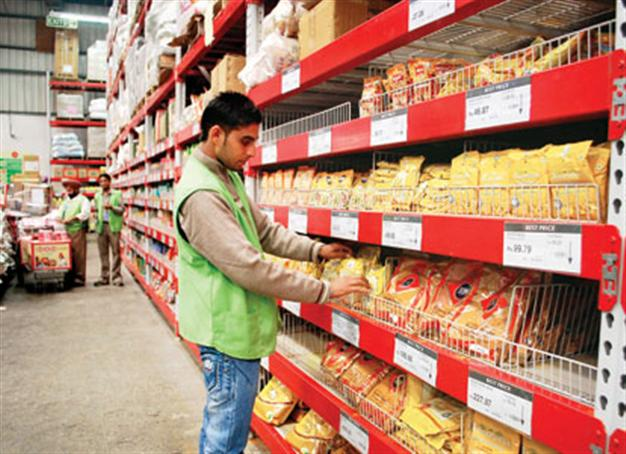
A worker arranges supplies in a grocery store in Amritsar, India on Nov 25. India’s Cabinet has decided to allow foreign investment in the nation’s retail industry. AP photo
India announced on Nov. 25 that plans to open its vast retail sector to global supermarket chains will create millions of jobs after the cabinet approved the reforms.
The pledge by Commerce Minister Anand Sharma came after heated opposition protests stopped the government announcing details in parliament about its move to relax foreign ownership rules for retailers such as Wal-Mart.
The changes are contested by opposition lawmakers who fear large supermarkets will kill small family-run stores.
The reforms will “give a fillip to job creation,” creating between five and six million jobs in transport and other logistics over three years, Minister Sharma told a news conference.
The government plan will open up the sector, worth an estimated $470 billion in annual sales, to allow Wal-Mart, Tesco and other global firms to hold a 51-percent stake in multi-brand retailers.
The cabinet also raised the foreign investment cap to 100 percent from 51 percent for single-brand retail operations such as Gucci, Nokia and Reebok.
“This has been a long time coming, and will be welcomed by big foreign and domestic retailers,” said analyst Arvind Singhal, head of consultancy Technopak Advisors.
‘A game-changer’
The Congress-led government has been seeking to fend off charges of “policy paralysis” after being engulfed in a string of corruption scandals.
Its decision, called a “game-changer” by India’s business leaders, was seen as a sign of its intent to press ahead with a reformist agenda despite strong political opposition.
Foreign multinationals have lobbied for years to sell directly to consumers in the world’s second most populous nation.
Multi-brand foreign groups currently operate as wholesalers in India but are prevented from selling directly to the public. The vast majority of consumers currently shop at small local markets